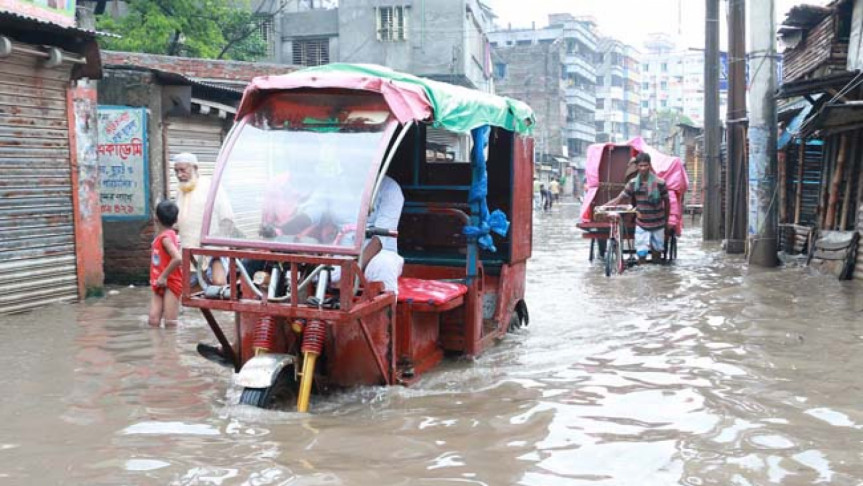Addressing water-logging: Looks ‘impossible, but still possible’

Dhaka: Though it appears to be an impossible task to eliminate the capital's perennial water-logging, urban experts think the authorities concerned can make it possible by restoring the city's natural drainage network through reclaiming 43 canals from grabbers.
Talking to news agency UNB, Prof Sarwar Jahan of Buet's Urban and Regional Planning (URP) department, ex-UGC Chairman and urban expert Prof Nazrul Islam and Bangladesh Paribesh Andolan (Bapa) general secretary Abdul Matin stressed the importance of proper maintenance of the existing drains and their upgradtion.
They said one-third areas of two Dhaka city corporations could not yet be brought under the coverage of drainage system for lack of canals, while the drains and storm-sewerage lines remain clogged with wastes for not cleaning those regularly.
According to them, Aedes mosquitoes-born diseases like viral fever are spreading fast in the city as the waste-blocked drains are not cleaned properly.
Most city areas went under knee-deep water after a heavy downpour on Monday and a moderate rain on Wednesday last.
Talking to UNB, the two Dhaka city mayors even admitted that the existing drainage system has the capacity only to flush out normal rainwater, not that of moderate and heavy ones.
According to a study jointly conducted by Buet and BRAC University in 2015, potential damages from Dhaka's water-logging is likely to be between Tk 110 billion and Tk 139 billion by 2050 if the government fails to construct flood-resistant infrastructures and upgrade the existing ones.
Prof Sarwar Jahan said rainwater flow is being obstructed due to unplanned urbanisation, construction of roads and houses and other structures occupying canals and water bodies.
"Historically, Dhaka had a drainage system of canals connected with surrounding rivers, but this natural drainage system has almost been destroyed. We also have not sufficient and effective artificial drains. The city's existing storm-sewerage can cover only one-third areas. Besides, the capacity of the surface drain and storm-sewerage get reduced as those were not properly cleaned and maintained," he said.
Prof Sarwar said the government has the capacity to reshape Dhaka as a smart city, but cannot for lack of proper action plans and trend to invest in building mega structures though a smart city should have less mega structures.
Prof Nazrul Islam said, "Most drains are blocked with wastes as those are not cleaned timely. City corporations are unable to ensure a proper waste management while people litter roads and drains for lack of awareness."
He also said construction materials like cement, clinker, bricks and sand are also blocking drains, affecting their capacity to flush out rainwater."More importantly, unplanned and poor quality drains can't help you out."
Abdul Matin said, "Barely 30-40 years back, Dhaka had a natural drainage system with the 43 canals connected with four surrounding rivers. But now most of those canals are filled up by influential people."
He said the two city mayors could not yet take any effective steps to get rid of city problems, including water-logging, over the last three years.
"People are no longer ready to buy the mayors' excuses that they are not getting help from different agencies to free the city from waterlogging. People want to see action to ease their sufferings," he added.
Contacted, Dhaka North City Corporation (DNCC) Mayor Annisul Huq said there will be no waterlogging in his areas after normal and moderate rains from the next year as they are renovating the existing drains and constructing new ones to enhance their capacity to remove rainwater.
Dhaka South City Corporation (DSCC) Mayor Sayeed Khokon said, "We're hopeful that the waterlogging problem will ease significantly from the next year, as construction and improvement of 85 percent drains have already been completed."





